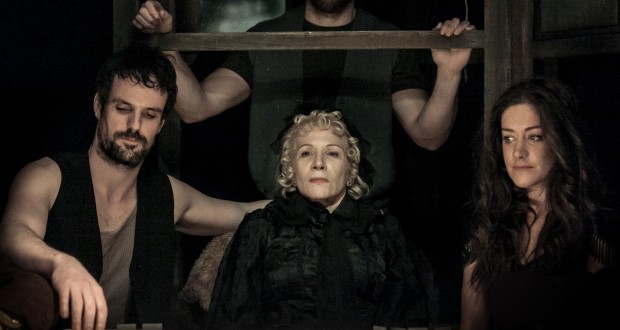Pros: Stellar performances, great vocals, and charming set changes.
Cons: The lovers’ breakdown is a little too rapid for a story of paralysing passion. This radical adaptation of Zola’s dark and shocking masterpiece is brimming with derailed passion, haunting criminality and withering comedy. Fans of the novel and the play should see this version.
Summary
Rating
Excellent
Thérèse Raquin is based on Zola’s deliciously bleak novel that charts the guilt-ridden consequences of a lustful and murderous union. This production at the Finborough Theatre is to be admired by all for including so many of the elements that a lot of staged productions choose to leave out.
The play is about ‘blood and nerves’, the opening mantra sung by the cast. Adaptor and director Nona Shepphard is keen to highlight Zola’s scientific study of how psychological temperament shapes behaviour. Thérèse is nervous and volatile. Laurent – her burly lover, who revives her from her loveless marriage to Madame Raquin’s sickly son, Camille – is sensual and energetic. The constraints of Thérèse’s domestic life make clear that this pairing is clearly not a good combo!
This two-act production starts as it ends. Madame Raquin sits immobile, staring down in hatred at the lifeless bodies of Laurent and Thérèse, their arms wrapped around each other. Thanks to a great set, top acting, and believe it or not, a dozen or so musical numbers, we hurtle towards this grim outcome with clarity and pleasure.
The set is an impressive wooden frame that functions as a small dusty haberdasher’s shop, the lovers’ bedroom, a dominoes salon and most drastically, a white-sheeted morgue. Surrounding the frame is the black wall of the narrow Passage du Pont Neuf that compounds Thérèse’s sense of claustrophobia. The choreography was superbly handled, with the cast making impressive use of such a small space.
Julia Atherton as Thérèse beguiles with her onstage naturalness. She does mute despondency startlingly well, staring vacantly into the audience for most of the first act. And when Thérèse does speak, she surprises us in being immediately calculating and self-assured. Laurent, played by Ben Lewis is equally charismatic. Their voices compliment each other beautifully and convincingly. All the cast performances were outstanding, particularly the subtle comic touches and cutting remarks of the guests gathered for their Thursday dominoes soiree. The audience laughed at the all too familiar manner of Camille’s petulant argument with his mother. Also the ‘so-what-do-you-think?’ moment of Laurent’s lurid painting of Camille was memorable – the lights’ instant drop to red makes Camille’s disconcerted reaction very clear.
Composer Craig Adams provides uneasy melodies and clever repetitions that serve the story well. Three local women and an oarsman make up the chorus. Their primary function is to reveal the thoughts of Thérèse’s desire of a fuller life and fears and the grief of her subsequent deceits. You are not still, Thérèse was my favourite and stood out for its more soothing qualities.
As a fan of the novel, a slight grumble I have with this production is that the story moves ever so rapidly through the lovers’ paranoia, delirium and breakdown. Since it is, as the programme suggests, ‘a story of paralyzing passion’, a bit more of this paralysis and demise was needed for me to feel the depraved lovers’ final act as necessary. The haunting painting, François the cat’s peculiar influence, the agony of the unhealed scar on Laurent’s neck from Camille’s futile resistance – they seemed to me somewhat rushed and underutilized. Still, the final scenes are handled with remarkable deftness and I was satisfied with that last sight of Madame Raquin’s almost complicit, vengeful gaze.
I continue to be blown away by the amazing theatre shows that are happening above some of London’s great but not necessarily well-known pubs. The Finborough Arms is a recently revived Victorian pub that has a cheerful atmosphere that makes you want to go back. The standard of this production is exceptional and as someone who doesn’t often see musicals, it has definitely made me greedy for more.
Author: Émile Zola
Adapted and directed by: Nona Shepphard
Music by: Craig Adams
Producer: Theatre Bench
Booking Until: 19th April 2014
Box Office: 0844 845 1562
Booking Link: http://www.finboroughtheatre.co.uk/productions/2014/therese-raquin.php
 Everything Theatre Reviews, interviews and news for theatre lovers, London and beyond
Everything Theatre Reviews, interviews and news for theatre lovers, London and beyond



